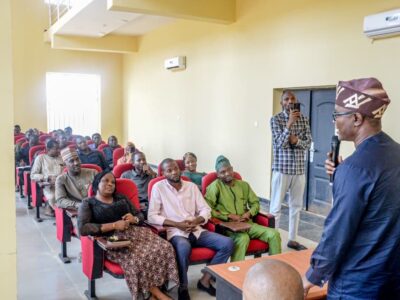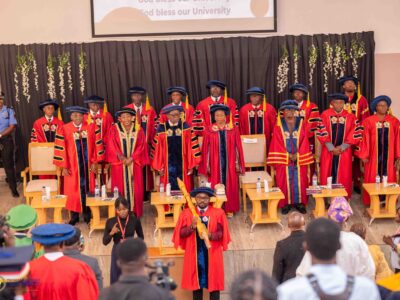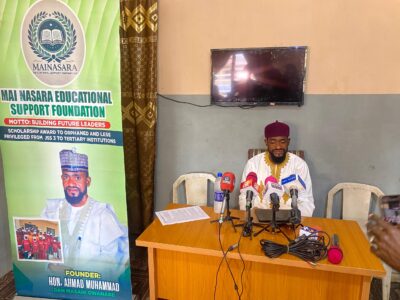By Admin
Maria Temitope Edunsin, a native of Esie in Irepodun Local Government Area of Kwara State, is the Chief Executive Officer of Your Pinnacle Global Initiative, a nongovernmental organization. She spoke on what informed her passion for nurturing youth for better future through counseling education.
Q- Can we know you and what your organization is set to achieve?
I am originally from Esie, Kwara State. I was born and raised in Surulere, Lagos. I left for the United Kingdom (UK) about 30 years ago, and I have been in the UK since. Your Pinnacle is a representation of my passion about humanity, our mental health and psychological well-being. It is a manifestation of what I have acquired over my life’s journey through environmental structure and my experiences, which I want to share with everyone to enable them to start the journey to their pinnacle.
Q- Counseling people, most especially young generation by NGOs like yours, seems very rare in our society. Why have you chosen that path?
I have been opportune to work with children, youth and adults in various mental health and educational sectors. I have also amassed a great deal of knowledge as the children’s coordinator in my church and I have seen and learned that the earlier children get counseling, the less likely they are to need it as adults. Also, I feel like it is necessary to educate the younger generation about counseling, make them understand what it is about, and this will in turn eradicate the stigma associated with mental health issues.
Q- How do you intend to go about it, since you are not based in Nigeria?
Thankfully my parents made sure they embedded our culture and heritage in my siblings and I. They ensured we knew where we came from and what that meant. Also, my husband and I are doing everything we can to educate our children about our culture and heritage, and sometimes this means doing research on things I am not familiar with and that in itself, is educating for me.
The idea behind YPGI is to first and foremost raise awareness about mental health, providing a haven for everyone by supporting them in their journey to reach psychological and mental well-being.
We are planning to do this by telephone, video and face-to-face counseling; we also hope to have mental health and counseling check-in facilities. Within these facilities, there will be therapy rooms and phone counseling call centers to enable phone counseling across the country.
Q- Compare to your country of residence, do you think Nigerian government is doing enough in the area of career counseling for students?
In all honesty, I do not think enough can ever be done as there is always room for improvement. But I think that career counseling should be introduced to students right from junior secondary school (JSS1), to give them orientation and counseling on career choices. More so, there is no specific subject that gives indepth details about each career including the occupational hazards, benefits, requirements and institution offering such career choices). This will prevent many students from being misled or pressured into careers by peers, parents and teachers.
Q- Is there any lesson you think Nigerian government or Schools can learn from how counseling is shaping life of people for good in abroad, most especially where you schooled and based (UK)?
Like I said earlier, there is always room for improvement, and as you know that nobody is the custodian of knowledge, I do feel like a couple of ideals could be adapted. First and foremost, it is important for the Nigerian government to eradicate the stigma attached to mental health by educating and clarifying to people the disadvantages of mental health and counseling stigma.
Furthermore, giving this knowledge to the general public will enable them develop and benefit from a free mind set towards certain issues, and on an individual level, this will allow services like ours to operate for the benefit of the people.
With schools, it is advisable to employ at least two professional counselors across all educational levels; primary, secondary and even tertiary, and make room for period of counseling, at least, once in a week. Finally, most students in abroad pass through school counselor before gaining admission into the school. It would be good if we could adopt that in Nigeria as well.
With universities, there is need for incorporation of therapeutic practical training, university placement opportunities, work experiences and volunteering.
Q- Nigeria is a big country with 36 States. Do you think your organization can cover all the states and achieve the desired result?
We aim to cover all States and we know this is no small task. So, like I said before, we planned to invest heavily in telephone and video counseling. Likewise, our mental health clinics will provide therapeutic rooms for face-to-face session for local and regional access to our services.
Reaching other States in Nigeria will hopefully be easy for the NGO as she is registered as a charity with the Corporate Affairs Commission (CAC), and I am a member of Counseling Association of Nigeria (CASSON), which gives me the privilege of raising awareness (online, seminar, workshop, collaborating with other NGOs and schools).
Your Pinnacle Global Initiative will also endeavour to employ professional staff, who can travel to each State and assist in creating awareness, giving face to face counseling, group counseling, talks, presentation and others.
We also hope to partner with the education system to enable training for current student counselors by providing them an environment where they can practice with real life situations and honest clients. This way, we will support them in becoming experienced counselors for a better career prospects.
Q- Is there anyone or organization bankrolling you for this project, considering financial implication?
At the moment, the charity is funded by donations from family, friends, the board of trustees and myself. In the long run, we hope to collaborate with the Nigerian government and other willing NGOs and organizations to make and sustain an effective and long lasting positive effect on the mental health of people in our community and country at large.
Q- Many people hold the belief that poverty is Nigeria’s major problem. Is your organization doing anything in alleviating suffering on vulnerable Nigerians apart from counseling?
I am of the opinion that it is better to equip people with all they need to succeed. Like the saying goes, give a man a fish, and he will be hungry again tomorrow; teach him to catch a fish, and he will be richer all his life. However, in the time when the man is still learning how to catch fish, there might be days when he will catch fish and days he won’t. In the coming days, we would, to the best of our ability, support them with fish to sustain them or as necessary.
Q- What is the long term objective of your organization?
The long-term objective is quite straightforward. The final goal is to support each and every individual on their journey to be the best versions of themselves to enable them reach their pinnacles by providing all the necessary mental and psychological support.
Source: The Herald










Comments